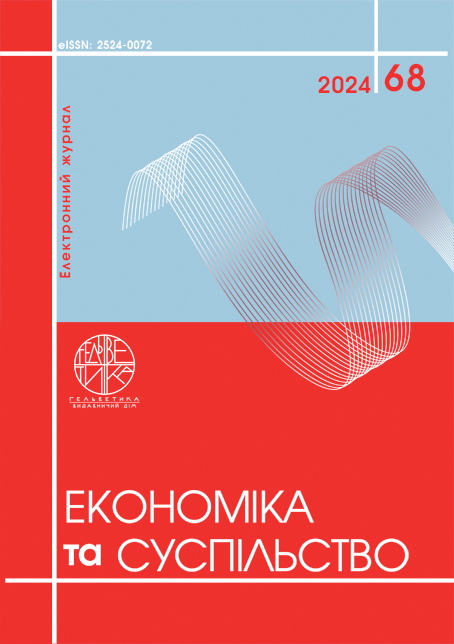ДВОФАКТОРНА ТЕОРІЯ МОТИВАЦІЇ ГЕРЦБЕРГА: КРИТИЧНИЙ ПОГЛЯД ТА ПРАКТИЧНЕ ЗАСТОСУВАННЯ
Анотація
Стаття присвячено аналізу двофакторної теорії Ф. Герцберга та її використанню в сучасних умовах. Мотивація виступає рушійним фактором як саморозвитку особистості, розвитку підприємства, так і економіки в цілому. В дослідженні відзначається, що мотивація грає важливу роль в успіху людей, сприяє їх задоволенню як в особистому, так і в професійному житті. Двофакторна теорія Ф. Герцберга, яка ще відома під назвою Мотиваційно-гігієнічна теорія, при поясненні мотивації працівників звертає увагу на два основних чинники: фактори мотивації та гігієнічні фактори. Підкреслено, що Ф. Герцберг зробив внесок у розвиток ергономіки та психології трудового колективу в рамках гігієнічних факторів, вказавши, що вони впливають на задоволення роботою. Загалом, теорія Ф. Герцберга дозволила розглянути мотивацію з людиноцентричного підходу, враховуючи аспекти, пов’язані зі змістом роботи, але, на думку більшості науковців, вона не стала повноцінною комплексною теорією мотивації.
Посилання
Bassett-Jones N., Lloyd G.C. Does Herzberg's motivation theory have staying power? Journal of Management Development, 2005. Vol. 24 Issue. 10. P. 929 – 943
Sachau D. Resurrecting the Motivation-Hygiene Theory: Herzberg and the Positive Psychology Movement. Human Resource Development Review, 2007. №6. P.377 - 393.
Ozsoy E. An empirical test of Herzberg’s two-factor motivation theory. Marketing and Management of Innovations. 2019. №1. P. 11-20. https://doi.org/10.21272/mmi.2019.1-01
Полюк М.І. Теоретичні підходи до мотивації персоналу у підприємництві. Ефективна економіка. 2020. № 4. http://www.economy.nayka.com.ua/pdf/4_2020/102.pdf
Слободянюк О. Е. Теорії мотивації. Матеріали XLVII науково-технічної конференції підрозділів ВНТУ, Вінниця, 14-23 березня 2018 р. 2018. URL: https://conferences.vntu.edu.ua/index.php/all-hum/all-hum-2018/paper/view/4124.
Теорії мотивації Герцберга, МакКлелланда, Скіннера, Врума в схемах. URL: https://www.talent-management.com.ua/4725-teorii-motivatsii-v-shemah/ (дата звернення: 14.09.2024).
Шпекторенко І. В. Теорія мотивації Ф. Герцберга у контексті структури професійної мобільності персоналу. Аспекти публічного управління. 2013. № 1. С. 78-83.
Pardee, Ronald L. Motivation Theories of Maslow, Herzberg, McGregor & McClelland. A Literature Review of Selected Theories Dealing with Job Satisfaction and Motivation. 1990. https://files.eric.ed.gov/fulltext/ED316767.pdf (дата звернення: 28.09.2024).
Herzberg F.I. The managerial choice: To be efficient and to be human (2nd ed., Rev.). Salt Lake City, UT: Olympus. References. 1982
Acquah A., Nsiah T.K., Antie E.N.A. & Otoo B. (). Literature review on theories motivation. EPRA International Journal of Economic and Business Review. 2021. Volume - 9, Issue – 5. P. 25–29. https://doi.org/10.36713/epra6848
Herzberg F.I.. Work and the nature of man. Cleveland: World Publishing Company. 1966
Alam S.M.I. Herzberg Motivation-Hygiene Fallacy in measuring levels of job satisfaction and dissatisfaction. Research and Review: Human Resource and Labour Management. 2021. N2(2). P. 34–43.
Kaswuri A., Amin M., Khairuzzaman W., Ismail W., Golshan N. M., Kaswuri A.H., & Aghashahi B. Effects of Motivational Factors on Job Satisfaction: An Empirical Study on Malaysian Gen-Y Administrative and Diplomatic Officers Privacy Rights for Digital Assets and Digital Legacy Right for Posterity : A Survey View project Effects of Motivational Fact. 2011 3rd International Conference on Advanced Management Science IPEDR, (November 2014). (дата звернення: 18.10.2024).
Rotter J.B. Some problems and misconceptions related to the construct of internal versus external control of reinforcement. Journal of Consulting and Clinical Psychology. 1975. N43(1), 56–67. doi:10.1037/h0076301
Furnham A, Eracleous A., Chamorro‐Premuzic T. Personality, motivation and job satisfaction: Hertzberg meets the Big Five. Journal of Managerial Psychology, 2009. Vol. 24. Issue 8. P. 765-779, https://doi.org/10.1108/02683940910996789
Bassett-Jones, N., & Lloyd, G. C. (2005). Does Herzberg's motivation theory have staying power? Journal of Management Development, 24(10), 929–943. https://doi.org/10.1108/02621710510627064
Sachau, D. (2007). Resurrecting the motivation-hygiene theory: Herzberg and the positive psychology movement. Human Resource Development Review, 6(4), 377–393. https://doi.org/10.1177/1534484307307546
Ozsoy, E. (2019). An empirical test of Herzberg’s two-factor motivation theory. Marketing and Management of Innovations, 1, 11–20. https://doi.org/10.21272/mmi.2019.1-01
Poliuk, M.I. (2020). Teoretychni pidkhody do motyvatsii personalu u pidpryiemnytstvi [Theoretical approaches to staff motivation in entrepreneurship]. Efficient Economy, (4). Retrieved from http://www.economy.nayka.com.ua/pdf/4_2020/102.pdf (in Ukrainian)
Slobodyanyuk, O. E. (2018). Teorii motyvatsii [Theories of motivation]. Materials of the XLVII Scientific and Technical Conference Units VNTU, Vinnytsia, March 14–23. Retrieved from https://conferences.vntu.edu.ua/index.php/all-hum/all-hum-2018/paper/view/4124 (in Ukrainian)
Teorii motyvatsii Hertsberha, MakKlellanda, Skinnera, Vruma v skhemakh [Theories of motivation of Herzberg, McClelland, Skinner, Vroom in schemes]. Retrieved from https://www.talent-management.com.ua/4725-teorii-motivatsii-v-shemah/ (accessed September 14, 2024).
Shpektorenko, I.V. (2013). Teoriia motyvatsii F. Hertsberha u konteksti struktury profesiinoi mobilnosti personalu [The theory of motivation of F. Herzberg in the context of the structure of professional mobility of personnel]. Aspects of Public Administration, 1, 78–83.
Pardee, R.L. (1990). Motivation theories of Maslow, Herzberg, McGregor & McClelland: A literature review of selected theories dealing with job satisfaction and motivation. URL: https://files.eric.ed.gov/fulltext/ED316767.pdf (accessed September 28, 2024).
Herzberg, F. I. (1982). The managerial choice: To be efficient and to be human (2nd ed., Rev.). Salt Lake City, UT: Olympus.
Acquah, A., Nsiah, T. K., Antie, E. N. A., & Otoo, B. (2021). Literature review on theories of motivation. EPRA International Journal of Economic and Business Review, 9(5), 25–29. https://doi.org/10.36713/epra6848
Herzberg, F. I. (1966). Work and the nature of man. Cleveland, OH: World Publishing Company.
Alam, S. M. I. (2021). Herzberg motivation-hygiene fallacy in measuring levels of job satisfaction and dissatisfaction. Research and Review: Human Resource and Labour Management, 2(2), 34–43.
Kaswuri, A., Amin, M., Khairuzzaman, W., Ismail, W., Golshan, N. M., Kaswuri, A. H., & Aghashahi, B. (2011). Effects of motivational factors on job satisfaction: An empirical study on Malaysian Gen-Y administrative and diplomatic officers. 2011 3rd International Conference on Advanced Management Science IPEDR, (November 2014). (accessed October 18, 2024)
Rotter, J. B. (1975). Some problems and misconceptions related to the construct of internal versus external control of reinforcement. Journal of Consulting and Clinical Psychology, 43(1), 56–67. https://doi.org/10.1037/h0076301
Furnham, A., Eracleous, A., & Chamorro‐Premuzic, T. (2009). Personality, motivation and job satisfaction: Herzberg meets the Big Five. Journal of Managerial Psychology, 24(8), 765–779. https://doi.org/10.1108/02683940910996789

Ця робота ліцензується відповідно до Creative Commons Attribution 4.0 International License.


